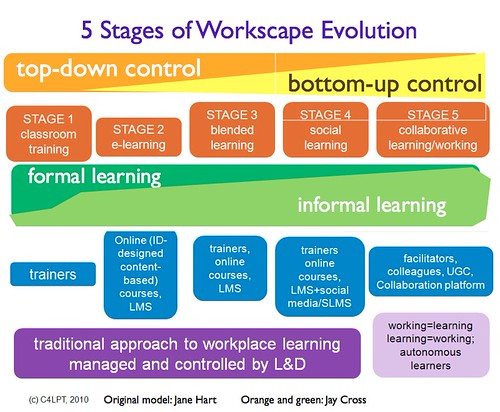It is well documented that the vast majority of learning in the workplace is informal.
According to research undertaken by the Center for Creative Leadership:
- 70% of learning occurs “on the job”
- 20% of learning occurs through feedback from others
- 10% of learning occurs “off the job” (eg attending classes, reading)
This 70:20:10 breakdown has since been supported by subsequent research, though sometimes the ratio is represented as 80:20 to reflect informal learning and formal training respectively.
Yet despite knowing these statistics – and sprouting them at opportune moments – many L&D professionals spend their time, energy and dollars in inverse proportion:
- 80% on formal training
- 20% on informal learning
Jane Hart and Jay Cross visualise this scenario in terms of the workscape evolution: the earlier an organisation is on its learning journey, the more formal and pushed is its training. As its philosophy matures, the process of learning becomes increasingly informal, self-directed and collaborative.
While the evolution of today’s workscape is currently underway, I contend that more must be done by L&D professionals to accelerate its progress.
And one way of doing that is by committing to “informal first”.
What is informal first?
Informal first is a mindset that prioritises informal learning over formal training in practice.
Whenever a development intervention is being considered, the primary objective of the L&D professional should be to provide all the necessary learning resources to the target audience in an open, structured format.
These resources will no doubt include text, but should also include images, audio, video, interactive scenarios, a discussion forum, downloadable job aids… you name it. Whatever is required to make the learning experience authentic and effective.
This pedagogical foundation facilitates pull learning at the convenience and discretion of the learner.
Moreover, it may stand alone to meet the organisation’s development need. In other words, there might be no reason for an employee to ever set foot in a classroom again!

Having said that, in some cases more instructional support will be required.
While “not liking this form of learning” is not a valid excuse in the modern workplace, other drivers might include: the subject matter being complex and thus requiring hand-holding by an SME; or the development need being time sensitive and thus requiring an SME to expedite the upskill; not to mention the fact that some training is just better done instructor-led, for whatever reason.
So, after informal learning has been addressed, sure – supplementary formal training can be considered.
Vive la révolution!
The “informal first” principle revolutionises the corporate learning model.
No longer is formal training the central offering with informal learning relegated to a support role. On the contrary, when we adopt the informal first mindset, informal learning becomes the central offering.
Formal training becomes value add.
